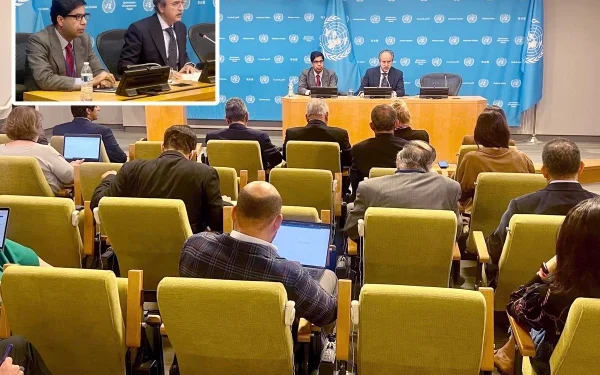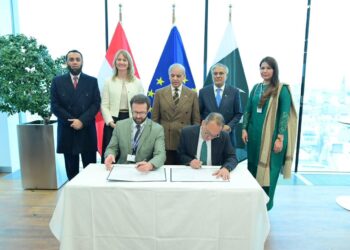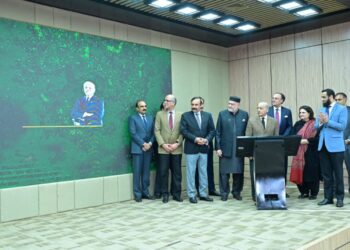New York, United Nations — In light of escalating tensions following a recent attack in Indian-occupied Kashmir, Pakistan is actively considering the possibility of calling a United Nations Security Council (UNSC) meeting. This move comes as Islamabad voices serious concerns over India’s recent aggressive posturing and actions, which Pakistan deems a threat to regional and global peace.
Background: The Kashmir Flashpoint and Recent Developments
The latest surge in tensions stems from a deadly attack in the Pahalgam area of Indian-occupied Jammu and Kashmir (IIOJK), which resulted in significant casualties. India has blamed external elements for the violence, insinuating cross-border involvement—an allegation Pakistan has categorically denied.
The longstanding Kashmir dispute, a nuclear flashpoint between India and Pakistan since their partition in 1947, continues to fuel conflict. Both nations claim the region in full but control parts of it. The United Nations and various international organizations have previously expressed concern over the deteriorating human rights situation in the region, especially since India revoked Jammu and Kashmir’s semi-autonomous status in 2019.
Pakistan’s Diplomatic Strategy: Raising the Issue at the UN
Speaking at a press conference at the UN headquarters, Pakistan’s Permanent Representative to the United Nations, Ambassador Asim Iftikhar Ahmed, emphasized that the international community must not remain silent in the face of India’s provocative actions. He signaled that Pakistan is weighing the timing of a formal request to convene a UNSC meeting.
“It is clear that an incident has occurred, but the current situation poses a real threat to international peace and security,” said Ahmed. “The Security Council, under its mandate, must take this seriously. Any member, including Pakistan, has the right to request a meeting.”
Ambassador Ahmed underlined that this diplomatic move is part of Pakistan’s broader initiative to inform the international community about the evolving security situation and Pakistan’s principled position.
Engagement with the UN and International Stakeholders
In preparation for a potential Security Council session, Pakistan has engaged with both the previous and current UNSC presidencies. France, which held the council presidency last month, and Greece, the current president, have both been approached by Pakistani diplomats.
“We are closely watching developments and reserve our right to call for a meeting at the appropriate time,” Ambassador Ahmed confirmed.
He further noted that the option to bring the issue to the global forum is not only within Pakistan’s rights as a UN member but also part of its responsibility to promote peace in the region.
Pakistan Welcomes UN Mediation but India Remains Unresponsive
During the press briefing, Ambassador Ahmed acknowledged and welcomed the efforts of UN Secretary-General António Guterres, who has historically advocated for dialogue between India and Pakistan to reduce hostilities.
“We appreciate the efforts of the UN Secretary-General to de-escalate tensions. Pakistan remains ready to cooperate with the United Nations, provided there is mutual consent. However, India has so far not responded to these efforts.”
Pakistan’s call for mediation echoes previous appeals for third-party intervention in the Kashmir conflict—an approach India has traditionally resisted, maintaining that the issue is a bilateral matter.
Responding to Indian Allegations and Misinformation
An Indian journalist at the UN briefing cited a controversial statement allegedly made by Pakistan’s Defence Minister Khawaja Asif, suggesting involvement in terrorism. Ambassador Ahmed dismissed the claim as a distortion and taken out of context.
“Let’s be clear: the Defence Minister’s statement was twisted. The reality is that India has a documented history of supporting terrorism, not just in Pakistan but even beyond, including North America. Pakistan is a victim of terrorism, not a perpetrator.”
He stressed that India’s disinformation campaigns and false narratives are designed to deflect attention from its own violations and aggressive policies in the region.
India’s Violation of International Law: The Indus Waters Treaty Controversy
One of the most alarming developments highlighted by Ambassador Ahmed was India’s decision to suspend the Indus Waters Treaty (IWT) of 1960, a crucial water-sharing agreement brokered by the World Bank.
“The unilateral suspension of the Indus Waters Treaty is illegal and unjustifiable,” said Ahmed. “There is no provision in the treaty that allows for such action.”
The treaty, signed in 1960, governs water distribution between the two countries and has withstood decades of conflict. India’s move to potentially halt or divert water flow has been described by Pakistan’s National Security Committee as an act of war.
“This is not just a legal issue; it’s an existential one. Water is life, and tampering with our share of natural resources threatens the very survival of millions in Pakistan,” Ahmed warned.
National Security Committee Response and Countermeasures
Following India’s aggressive actions, Pakistan’s National Security Committee (NSC), chaired by Prime Minister Shehbaz Sharif, held an emergency meeting on April 24. The NSC reviewed the situation and adopted a series of countermeasures to safeguard national interests.
These actions included reaffirming Pakistan’s commitment to its sovereignty, urging the international community to take note, and planning a potential escalation of the issue at international forums.
Human Rights Concerns in Indian-Occupied Jammu and Kashmir
Another major issue raised by the Pakistani envoy was the worsening human rights situation in Indian-occupied Jammu and Kashmir. Ambassador Ahmed condemned India’s continued use of excessive force, including extrajudicial killings, house demolitions, and collective punishment of civilian populations.
“These violations cannot go unnoticed. The international community must hold India accountable. Kashmiris are being punished for merely demanding their rights under international law.”
Human rights organizations have repeatedly reported abuses in the region, but action from major international bodies remains limited, largely due to geopolitical interests.
A Call for Peaceful Coexistence and Dialogue
Despite the provocations, Pakistan reiterated its desire for peaceful and constructive relations with all its neighbors, including India. However, Ambassador Ahmed emphasized that this goodwill cannot be one-sided.
“We are ready for peaceful dialogue based on mutual respect, equality, and sovereignty. But for that to happen, there must be genuine seriousness from both sides.”
Greece’s Role as Security Council President
Greece, which holds the presidency of the UN Security Council for the month of May, has acknowledged Pakistan’s concerns. Greek diplomats have indicated that a meeting could be convened soon to discuss the India-Pakistan standoff, with the aim of reducing tensions through dialogue and diplomacy.
This development adds to growing international interest in the conflict and could provide an opportunity for member states to weigh in on possible diplomatic solutions.
Conclusion: The Path Ahead
Pakistan’s measured yet firm diplomatic stance highlights its strategic intent to resolve tensions through international legal frameworks while defending its national interests. As Islamabad considers requesting a Security Council meeting, the world watches closely. The possibility of conflict between two nuclear-armed neighbors is not just a South Asian issue—it is a global concern.
With water rights, terrorism allegations, and human rights violations at stake, the United Nations faces a critical test: whether it can act decisively to de-escalate a potentially volatile situation and uphold the principles of peace and international law.

























